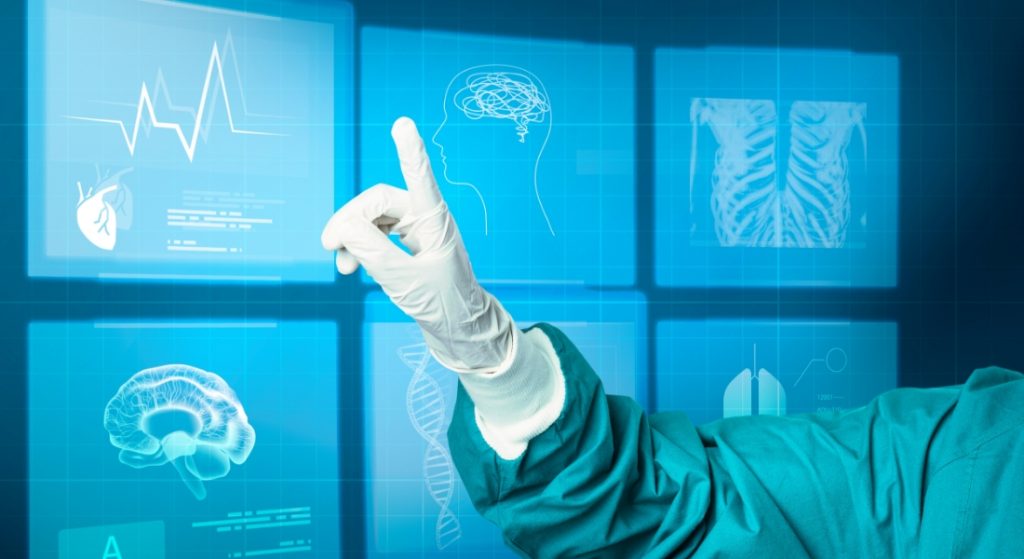Artificial intelligence is beneficial to the healthcare sector. It is introducing new perspectives into how healthcare is conducted daily. A significant amount of data is produced daily in hospitals and other medical facilities as the transition to digital healthcare picks up speed. Processing such large amounts of information manually is difficult, which is where AI can help. Today, we’ll examine the top 10 benefits of AI in healthcare in 2022.

Robotic surgery powered by AI is becoming more popular and it is considered as one of the many benefits of AI in healthcare. The most minor & most precise actions can be carried out with excellent efficiency by AI surgical systems. Operations that require a lot of blood can be performed with less risk of adverse effects. As surgeries are performed with extreme precision, patients also recover more quickly.
According to studies, the market for surgical robots is predicted to reach $24 billion by 2025.
By utilizing real-time tracking of events like heart attacks and asthma attacks, connected devices can help save lives. IoT networks are used by remote monitoring devices to connect and follow bodily activity. You can use wearable technology or mobile applications to access data, and you can use AI to make quick choices. By 2026, the market for wearable technology is anticipated to be worth $74 billion.
Intelligent medical devices enable real-time alerting, tracking, and monitoring, allowing for practical learning remedies, improved accuracy, extra help from doctors, and improved overall patient healthcare service outcomes. Sensors can be used to track wheelchairs, scales, nebulizers, pumps, or monitoring equipment, making it easier for staff to keep track of them.
In this decade, artificial intelligence combined with Augmented/Virtual Reality has the potential to revolutionize telehealth. It has many apps, from improving healthcare services to training medical students in real-time simulations.
AR and VR technology can help stroke victims overcome motor deficits. Simulated environments can provide effective stimulations that physical therapy cannot. The information gathered from such techniques can be used by therapists to create the best treatment plans for their patients.
Exercise programs are significant for enhancing one’s general health. AI can create workout routines that you can frequently use to reduce hazards in the future when it has access to medical records and the ability to foresee difficulties. It can significantly reduce future issues by making small everyday efforts.
For critical patients who have exhausted all other medicinal options, clinical trials of experimental cures may be their only remaining option. However, finding and signing up for such trials can be somewhat tricky. Following a thorough screening process, patients must search via government databases to meet the inclusion/exclusion criteria. A centralized application that links patients with the appropriate trials can make all of these simples. By reviewing their medical information, AI can automatically assess patients while saving time.
The most promising methods for treating cancer are those that involve immunotherapy. By utilizing the immune system to combat cancer, patients may be able to conquer resistant tumors. Oncologists lack a precise method for identifying which patients might benefit from immunotherapy; therefore, only a tiny percentage of patients benefit from the available medicines.
Machine learning algorithms and their ability to combine highly complicated datasets might be able to provide therapeutic options that are specifically suited to each person’s genetic profile.
Insurance firms can collect health data through linked devices for underwriting, processing health claims, and managing risk. It eliminates bogus claims and offers transparency between clients and insurance.
Training is made more efficient thanks to AI, which enables healthcare professionals to participate in simulations based on a sizable database of scenarios. These simulations help students judge and learn from prior responses to achieve training requirements.
Safeguarding private patient information is crucial in the healthcare industry. Rapidly developing AI algorithms assist in encrypting patient data, clinical reports, diagnostic results, and other information to protect it from hacking and store it securely in the cloud for access by patients and professionals anywhere.
Artificial intelligence has affected every industry, and healthcare is no different. There are many risks involved, but given the numerous benefits of AI in healthcare, it must eventually become an essential component of healthcare. AI has made an impact everywhere, from hastening the development of life-saving therapies to enhancing patient care! Explore DevTechToday to learn more about technology and sign up for more updates.